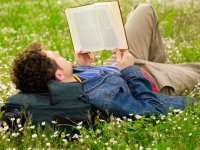Summer Reading and Rejuvenation
Teaching would not be possible without time devoted to reflection and rejuvenation. In the same way that crops need to be rotated so that soil can be replenished, teachers need time away from the classroom to rediscover different parts of their identities and return to classrooms and students with renewed joy, creative ideas, and reaffirmed visions of themselves as educators.
Summer is a time for reflection, scholarship, and a chance to give myself a break from the daily cycle of planning and feedback that make the school year such a whirlwind. The choreographer Liz Lerman first introduced me to the idea of mechanization of movement and the importance of breaking out of what inevitably and unconsciously becomes routine. While teaching is far from mechanized, I can relate to the idea of repetition as a force that causes us to lose sight of a vision of possibility.
A Plan for the Summer
In order to challenge the inevitable feelings of burnout and mechanization that I feel in June, I use summer to immerse myself in books and open myself to unplanned discoveries, ideas, and inspiration for the next school year. I aim to keep the list of books broad and include many different titles. My hope is to challenge and nurture myself in ways that relate directly to my teaching practice and in ways that nurture my identity outside of teaching.
Below is my summer book list, not including all of the fiction that I plan to devour. Maybe you will find inspiration in some of these titles, or maybe there are others that you would like to add in the comments section below.
For My Creativity and My Soul
Natalie Goldberg brings a Buddhist sensibility to writing practice and creativity. In Writing Down the Bones, she says: "Learning the write is not a linear process. There is no logical A-to-B-to-C way to become a good writer. One neat truth about writing cannot answer it all. There are many truths. To do writing practice means to deal ultimately with your whole life." This summer I plan to read Goldberg's book and embark on a regular practice of writing.
The Artist’s Way by Julia Cameron is about nurturing and discovering creativity. I first read this book years ago and remember the joy and challenge of the different recommended exercises. Cameron writes: "Creativity is an experience -- to my eye, a spiritual experience. It does not matter which way you think of it: creativity leading into spirituality or spirituality leading to creativity."
Teaching requires teachers to navigate so many important moments in the midst of activity and chaos. Thich Nhat Hanh ’s Being Peace and Peace Is Every Step are both simple, beautiful books that remind me how I have the capacity to deal with challenges while maintaining balance and an awareness of self. I look forward to rereading each of these books.
For My Analytical Side
Technology is integral to my teaching practice and the ways that I connect with people, information, and ideas. I want to use the summer to reflect on the role of technology in my life and in the lives of my students. Sherry Turkle's book Alone Together seems to raise many important questions about how technology can subtract from our humanity. In the Author's Note she writes, "Thinking about connectivity is a way to think about what we meant to each other."
Whenever I speak with my students about their relationships to technology, I am struck by their insights and experiences. It's Complicated: The Social Lives of Networked Teens by danah boyd "attempt[s] to provide critical insight into the networked lives of contemporary youth." I look forward to comparing the findings in the book to my own perceptions of my students, and then turning to my students to find out more of what they think.
So much of creating a successful learning culture rests on nurturing relationships and building community. A friend recommended Difficult Conversations: How to Discuss What Matters Most for the simple, straightforward approach it offers for dealing with conflict.
About Education
Once I have taken time to reclaim different sides of myself and my humanity, I always find myself excited to think more deeply about teaching and my own practice. There are some great new education books this year, include Thrive by my colleague Meenoo Rami and This is Not a Test by the always-insightful Jose Vilson. I also hope to reread some of John Dewey's writing and check out some of the other titles collected on the Edutopia/ASCD Summer Reading Pinterest Board.
Self-Rediscovery
Although the common perception is that teachers get the summer off, we honor our work, our students, and our profession by using the summer to prepare ourselves to be renewed, fresh, and inspired for a new school year. For me, this means using the summer to rediscover and reconnect with different parts of myself while finding new ways to be a caring, supportive, creative, joyful adult and scholar in the lives of my students.
